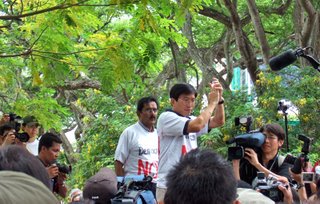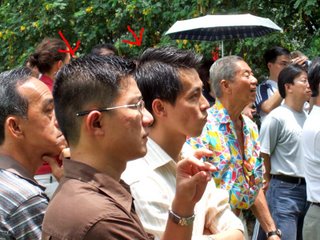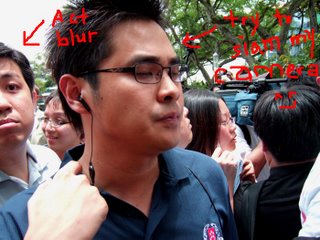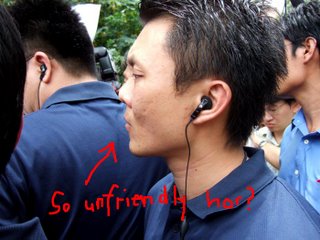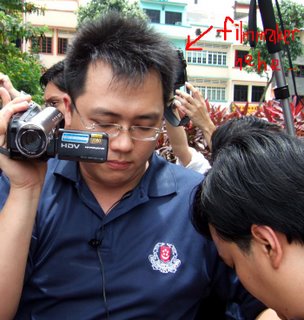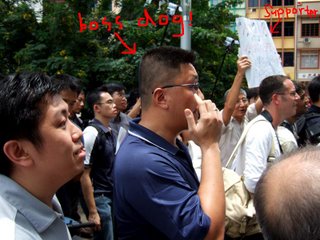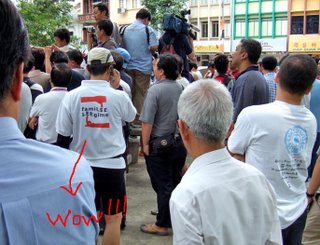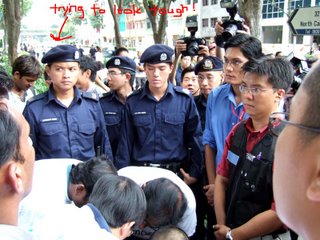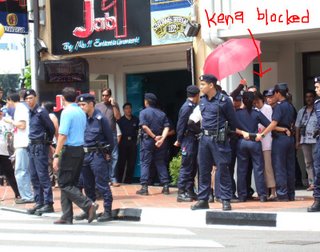“What is a democracy? Constitutions and elections do not make a democracy. Rule of law and independent institutions are also needed.”
When I saw the above caption in this morning’s Shit Times, I got curious and decided to flip flip a bit and look see. Wah lao, which writer from the 140th media so daring to write the truth and criticize the PAP gahmen, I thought...
But after spending 15 mins wading through the article by Jenadas Devan (son of Devan Nair and a hardcore PAP sycophant), I must say the 140th did not disappoint me and has once again proudly defended its 3-digit “first world” ranking hehehe.
Since I dun subscribe to ST Interactive (so cannot cut and paste, plus I am not crazy enough to type out everything) I will just quote some of the relevant passages and let my fellow recruits know the structure and flow of the article and what it tried to say.
“What is democracy? A tortoise, not a hare” is the heading. Jenadas began by laying down the general universal definition of democracy - one where there is fair and free elections held at regular intervals, where citizens’ rights are constitutionally protected and powers of gahmens circumscribed by law – and he went on to ask, “How would Britain, one of the world’s oldest democracies, fare by this definition?”
And Jenadas’s answer is “Not well.” His reasons are:
1) Britian does not have a written Constitution. However Jenadas concede that this is the case of many former British colonies including
2)
But never mind, the article still got a long way to go. Jenadas next brought up the current situation in
Describing the Thai political process and its latest coup, Jenadas said that “every Thai intellectual I spoke with on the phone took the line... that the coup was a necessary evil... There were no other options to end the political impasse,” or “the military revolt was a democratic act... it is necessary to use undemocratic means to save democracy.” Really what Jenadas is trying to say is that the experienced Thai political process and numerous Constitutions are still far from perfect, and that any other means outside of the political process is to be avoided and frowned upon. Jenadas at this point appears to be steering his article towards the issue of legality and rule of law. Is Jenadas going to suggest that the rule of law (however imperfect dat law could be) should be stuck to stubbornly even if it means a continual political impasse, as in the case of Thaksin vs Democracy? That a coup, which is illegal, should never be an option used to dispose a burgeoning dictator even though not a single shot was fired and that 80% of Thais approved of the coup?
Hmm... This Jenadas quite clever and cunning hor? You see where he is going?
Anyway Jenadas now asks, “What does all this tell us of the prospect of democracy in
A typical 66.6% kind of reader would most likely have been quite worn out by Jenadas’s long winded writing and decides to skip the rest of the article. He/she would leave with the impression that the Thai and British democracies are lousy ones, and conclude without further reading that the S’pore system is damn solid and free of problem. They will continue to subscribe to the 140th to get their daily fixes thinking that everything is steady bom pi pi.
But for the rest of the readers who are willing to think a little more critically (or just damn free like me hehe), further reading from this point onwards will be very frustrating. Bcoz this Jenadas starts to make no sense.
He made two points.
First, right on cue Jenadas makes the point about rule of law, that democracies must have independent institutions to enforce that rule. But what he said next failed to make much sense - “If Thailand’s political reformers had expended as much energy creating these institutions – among them an independent judiciary and police – as they did perfecting the electoral systems, the country would not be in the fix it is in today. But because it lacked such institutions, Thaksin was able to commandeer the legal process, and his opponents, unable to seek redress through the courts, felt they had no alternative but to call in the army.”
This sounded right at first, but think a little further and one will see that it is nonsense. Thaksin commandeered the legal process bcoz he managed to make those institutions no longer independent through installing his friends and cronies in them, and not bcoz those institutions are unnecessary or were not independent as Jenadas is wrongly suggesting! The Thai police and army made sure they did not take sides during the months of public protests in
Second point, Jenadas say “Democracy requires everyone to accept the rules of the game, to live and let live.” Jenadas is saying that the coup that led to the downfall of the majority-elected Thaksin gahmen is breaking the rules of the game. He defends his position by saying the “spirit of playing by the rules is best exemplified in Britain, where no matter who is in power, Her Majesty (or the idea of sovereignty) stays put on the throne, the game goes on, everyone lives and let lives.” However the Thai situation cannot be compared to that of
“And finally,” says Jenadas, “it is important to realize that democracy is not the work of one generation but of many.” He makes the point that of the 10 Asean states today, only 4 are democracies –
Here, Jenadas has failed to get his facts right.
Rounding off, Jenadas lamented that “as recently as last week, numerous human rights groups would have described both countries (i.e. S’pore and
No doubt Jenadas is referring to the PAP gahmen's major PR blunder and projected poor image that most international media focused on in the just concluded IMF-World Bank meeting. Jenadas in trying to defend his political paymaster but in doing so he has committed yet another contradiction. It is true that democracy takes time as evidenced by the experiences of
I dunno what Jenadas is smoking, but I’m sure it isn’t legal hahaha!
The way he made sweeping statements is truly amazing. But really the most glaring shortcoming in Jenadas’s long winded writing is his failure to critically examine the system he seeks to praise. It means that his writing is far from being balanced and fair. Suddenly when it comes to S’pore he decides to switch off his thinking hat and become a PAP and gahmen mouthpiece. This is why the 140th will always remain as the 140th, it is really good at brainwashing. Read it at your own risk!
